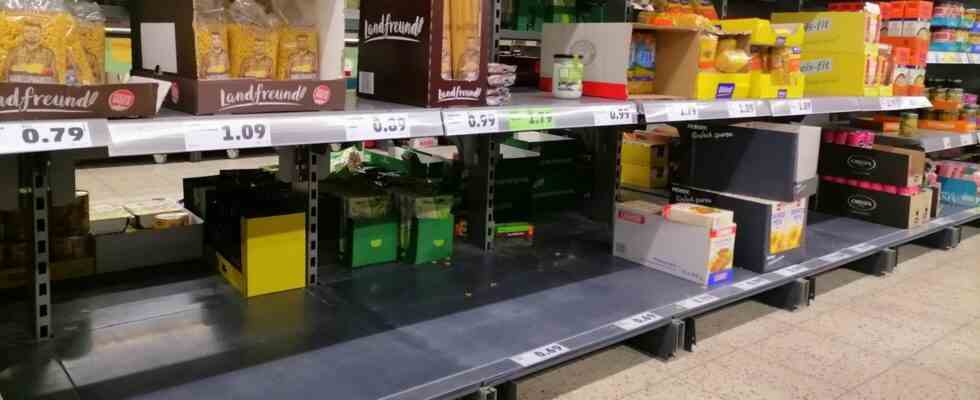Empty Supermarket Shelves
Hamster purchases of cooking oil – there is no reason to panic
More and more cooking oil shelves in Germany are currently empty (symbol image)
© Frank Bründel / Picture Alliance
Fearing the effects of the Ukraine war, more and more people are hoarding cooking oil. First the price rose, now some consumers stock up for emergencies. The result is empty shelves in many supermarkets.
This article first appeared on RTL.de.
Cooking oil is two years later what toilet paper was in 2020. You have probably already noticed in the last few days: In the supermarket there is sometimes a gaping emptiness on the shelves where the oil is actually to be found. In some cases, customers are even asked to be considerate and only load a few bottles into the shopping trolley.
Why is that? Many people currently feel compelled to stock up. They are hoarding because they are probably afraid of the effects of the Ukraine war. But will there ever be a food shortage? And what should you really have at home?
Limited supplies of cooking oil due to war, bad harvests and high costs
The war in Ukraine is also making itself felt in our supermarkets. Sunflowers, rapeseed, linseed and soya – these are all important raw materials that come to us in Germany, primarily from the Ukraine. Due to the currently critical situation on site, the raw materials can only be delivered to a limited extent. But crop failures, staff shortages due to the coronavirus pandemic or increased production costs due to high energy prices also play a role in the current problem.
And what are the raw materials usually processed for? To cooking oil. The logical consequence: Oil initially became more and more expensive. But now many supermarkets have already taken tougher measures; many supermarkets limit the sale of cooking oil to “household” quantities. You will currently not be able to buy more than two to four bottles in some supermarkets.
Preparing for an emergency is not bad in itself
In principle, there is nothing wrong with wanting to prepare for emergencies. Because: Emergencies – whether it’s a pandemic, a natural disaster or a political event – usually happen suddenly. Life changes from now on.
The Federal Office for Civil Protection and Disaster Assistance (BBK) also advises precautionary measures. The website says: “Those who are prepared can help themselves, relatives and neighbors until state aid arrives and reduce damage with protective measures.” In order to be prepared for possible emergencies, the BBK recommends that you have supplies at home for around ten days.
You should have these foods at home
On its website, the Federal Ministry of Food and Agriculture lists all the foods that you should have on hand in the following quantities as a basic supply. Initial situation: A person who eats an average of around 2200 kilocalories (kcal) per day:
- 3.5 kg grain products (potatoes, bread, pasta, rice, etc.)
- 4 kg vegetables (preferably canned)
- 2.5 kg fruit (also best stored in cans)
- 20 liters of beverages (such as water, tea or instant coffee). Important: For people aged 65 and older, an increased drink intake of 2 liters per person per day is recommended.
- 2.5 kg of milk and milk products
- 1.5 kg eggs, substitutes for meat/sausage and fish
- Amount at will for foods that don’t need to be heated or cooked (sugar, honey, chocolate, flour, instant broth, hard cookies, pretzel sticks)
- approx. 357g fats and oil. To be more precise: 0.214 liters of cooking oil.
Speaking of which: For a ten-day supply, you should have the equivalent of around 200 milliliters of cooking oil on site. A conventional bottle of oil from the supermarket usually contains 500 milliliters. Means: You should initially get by with one bottle without any problems. Buying eight more bottles just to be on the safe side isn’t necessary.
Supermarket chains could take action against hamsters
The Federal Association of the German Food Trade (BVLH) has already appealed to people in Germany to refrain from buying hamsters, as the dpa reports: “Please show solidarity and only buy what you need immediately.” The Association of the Oilseed Processing Industry in Germany (Ovid) had warned that sunflower oil in the Federal Republic could become scarce in a few weeks because of the Ukraine war. However, consumers could easily switch to other edible oils such as rapeseed oil.
The supermarket chains have already reacted to the bottlenecks. Edeka, for example, explained: “There is still no reason to create additional stocks.” The sufficient supply of all products of daily use can continue to be ensured, even if there could be short-term delivery bottlenecks in individual cases. Even if cooking oils from Ukraine are not on the shelves, customers would have the opportunity to switch to other alternatives.
Edeka, as well as Rewe and the discounter Aldi Süd are appealing to their customers to only buy certain products in quantities that are normal for households. “In the event of larger inquiries, we reserve the right, as always, to temporarily limit the delivery quantity per customer,” says Aldi Süd, for example. According to BVLH spokesman Christian Böttcher, this was the right decision.
You should also have these things at home
We will show you which medicines and hygiene items you should have on site in an emergency here. It is also worth taking a look at the website of the Federal Office for Civil Protection and Disaster Assistance (BBK). There you will find a complete checklist as well as information on what to pack, for example, if you suddenly have to leave your home due to an emergency. For example, make sure you have all important documents with copies – this saves you time.

